31 August 2013 (Cervantes Other Side, Denver CO)
Always pay attention to the details... I was excited when I heard that the Pimps of Joytime were hitting Colorado again. I carefully noted the time and place and made arrangements to come down to Denver for the show. At the last minute, I found out that I could have saved a drive: they played at the New Belgium Brewing's Tour de Fat party earlier the same day in my town of Ft. Collins. I'm not sure how their set went in FC, but they took their time and banged out a long set at Cervantes. So, I'm not feeling
too bad about my choices.
This was the first of two nights for the band, acting as the after-party for the Phish show at Dick's Sporting Goods Park at Commerce City.

I seem to catch one-man band Funkma$ter (Matt Grundstad) about once every couple of years and each time I'm more impressed. His 2009 show with That 1 Guy (
review) demonstrated his technical competence with his instruments and looping, but lacked a strong stage presence. By 2011, opening for John Popper (
review), his technique was stronger and he did a better job of engaging the audience, but he still had trouble managing the flow of building layers and entertaining at the same time. This weekend, he proved that he's overcome these limitations.

In part, he owes some credit to the vocalists that joined him on stage. Three rappers,
EZ,
Spellbinder, and
MCbig House, brought hype and harmony to the show. Their contrasting styles alone added a lot to the mix. EZ had a classic hip hop style, with a smooth cadence and good versatility that allowed for some soul. Standing center stage, he was laid back and balanced the bouncier energy that Spellbinder exuded. Spellbinder favored more of a world riddem style, toasting over reggae grooves and spitting out some speedy lines. MCbig House, by contrast, was a more solid presence. His lower timbre and more serious look added gravitas to the line up. Other contributors stepped in briefly to add their own voices, adding to the show's fluid energy.
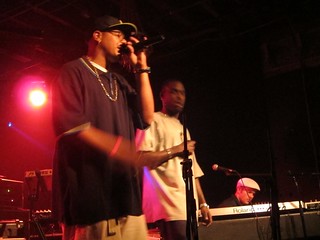
But even with surprise guests and loose patter on stage, this wasn't a casual throwdown. The group had clearly developed material that traded on the members'strengths and gave each one some showcase moments. Funkma$ter himself has developed as a performer, too. Even though his posse helped cover during the layering process, he has become adept enough to split his attention between his playing and the crowd. So, a lot more of his personality came through and connected.
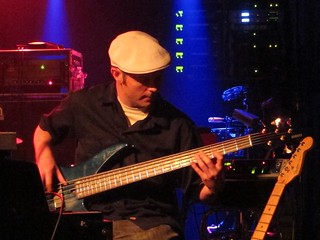
As the group ran through a fun mix of hip hop, reggae, and funk pieces, the crowd ate it up. Dr. Dre's "Let Me Ride" had the audience singing along while Funkma$ter mixed his loop like a DJ, picking which elements to emphasize. Another great song was a cover of Don Carlos' "Young Girl".
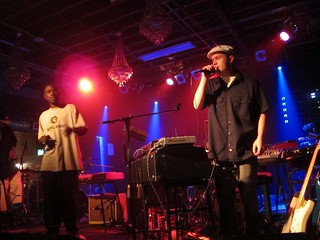
Funkma$ter and Friends had a solid set, from the sparsely crowded opening to the mass dancing party at the end. They proved to be a stronger match for the headliner than the band that followed them.
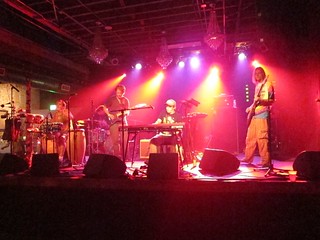
Haters deride jam bands for empty noodling and self-indulgent songs that drag on forever. I've defended bands like Phish and Umphrey's McGee as a modern day take on jazz traditions, pointing out their technical prowess at creating intricate arrangements and deftly controlling song dynamics.
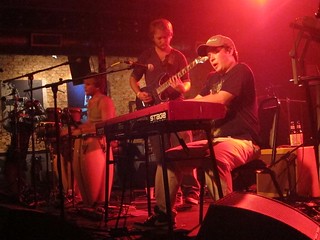
Given the Phish connection for this show, it probably made sense to bring in a jam band. I don't think that it was a great fit for the Pimps of Joytime, either musically or personality-wise, but the crowd seemed to enjoy the set well enough. To their credit, Denver's Mlima had fine technical chops and managed some tight dynamic shifts. They were well practiced and, unfortunately, they were boring.

The music itself wasn't lacking; their guitarist, Doug Litvak, is phenomenally talented and his virtuoso playing carried many of the songs. The problem is that the band was too inwardly focused, making it hard to relate to them. Each player was in his own world, locked into his own part. Aside from occasional glances and nods, there was little acknowledgment between the players and almost no interaction with the audience.
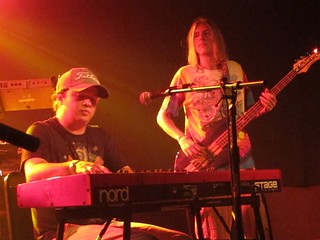
Since the music was all instrumental, the only verbal communication came during pianist Matt Telsey's terse moments of stage patter between songs. After reassuring himself that we were still excited to see the Pimps of Joytime soon, he'd briefly mention the next song's title. Sure, there are plenty of examples of strong entertainers performing solely instrumental music. But in the cases where they aren't big conversationalists -- Miles Davis comes to mind -- they can still radiate an intensity during their playing. For the most part, Mlima only mustered a sense of preoccupation.

Nick Miller's percussion work was the one standout exception, because he exuberantly attacked each song. He was still primarily locked in his own headspace, but it looked like a fairly interesting place. In comparison, Litvak consistently laid down some jaw dropping riffs, but rarely expressed more than a vague distraction.

Mlima should take a lesson from Phish. If they set up the songs with stories or, at the least, moved with the music and expressed some passion and personality, then they'd have a much stronger act. They have the talent to milk some acid funk intensity out of a simple four measure looped progression; they should be able to make it more of a show.
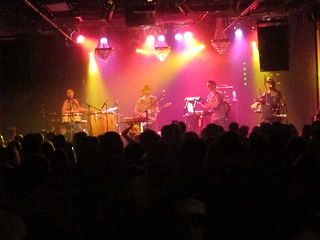
If there's one thing that the Pimps of Joytime have going for them, it's personality and passion. Those two things alone would be enough to power a great performance, but they throw in tight arrangements, smoking chops, booty shaking beats, and catchy songs that stick in your brain.

The band came out kicking ass, immediately diving into a solid funk jam with cool Latin percussion. After getting everybody moving, they dropped back into a Sly Stone groove for "My Gold". Frontman Brian J squinched in tight and laid down a sweet falsetto vocal for what turned into a soul funk dance party. When the time came to solo, he launched into a spaced-out psychedelic lead that sparked the crowd. He was an expressive player, posing to match either the sound he's wrenching from his guitar or the mood of the song. Even when he dropped back to let someone else drive, he danced along to stay fully connected.
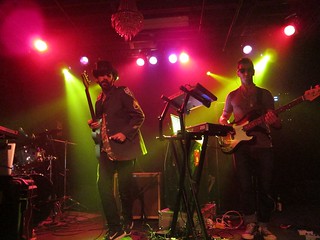
While the Pimps of Joytime make funky soul their home base, they didn't handcuff themselves to it. Instead, they branched out into other realms, like blues, pyschedelia, and synth-pop. Their aim was to keep the audience moving and engaged with the music. Little tricks, such as sampled vocal snippets and electronic beats, were used to offer up surprises and liven up the songs. So, a track like "Keep That Music Playin'" at first suggested a P-Funk jam, but then keyboard washes and percussive samples took it somewhere new.

It was a show full of great songs, but I think my favorite piece was "San Francisco Bound". It started out mellow, with trippy keyboard riffs and heavily reverbed guitar, sort of like the Doors jamming with soul legend Shuggie Otis. Once the band set their hypnotic groove, Brian J let his guitar go exploring the space they created. Eventually the song evolved into a Zappa-esque jam reminiscent of "Dirty Love" (
Overnite Sensation - 1973).

After "San Francisco Bound", most of the band took a break, leaving the bass player to cut loose on his synthesizer set up. After an extended electronic jam, the drummer came back out and joined in. This led to the best visual moment of the show. During the drum solo, the lights shifted color and strobed to match. The tight coordination as every syncopated beat was reflected in the light show was amazing.
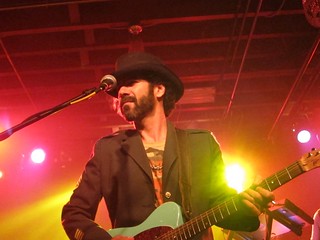
As the rest of the band came back out, it was hard to imagine that there was still about another hour left in their set. These guys rocked it non-stop, demonstrating why they are one of the world's best touring bands. After a certain point, there was less motivation to track the individual songs. Instead, it was best to live in the moment, appreciating each punchy bassline, each sinuous percussion syncopation, and each speedy drum fill. Throughout it all, Brian J played ringmaster, raising his hands exultantly or seeing how
nasty he could treat his guitar.
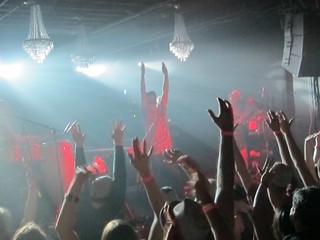
It was a long drive back home to Ft. Collins, but I was happy to have found my own joytime that night.
More photos on my
Flickr
 No matter where you go, there you are. Temporary distractions and denial eventually bow to the truth and the truth is not pretty. Over the last two and a half decades, Trent Reznor used
No matter where you go, there you are. Temporary distractions and denial eventually bow to the truth and the truth is not pretty. Over the last two and a half decades, Trent Reznor used  Some things never change. Oh, the record label can change. They can have the band streamline and change their name. They can even bring in a new producer to change the sound. With the opening grunge grind of “
Some things never change. Oh, the record label can change. They can have the band streamline and change their name. They can even bring in a new producer to change the sound. With the opening grunge grind of “
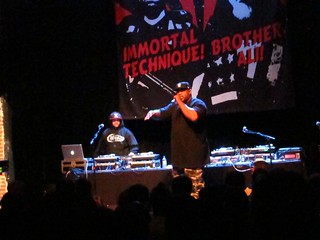
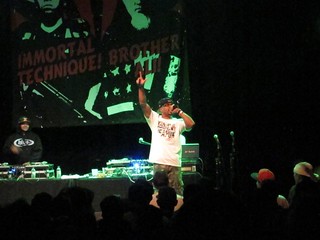
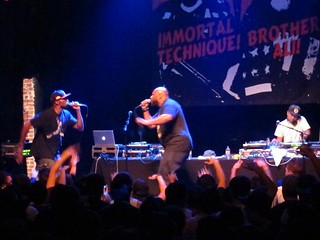
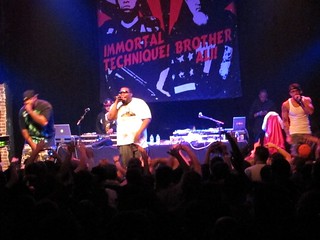
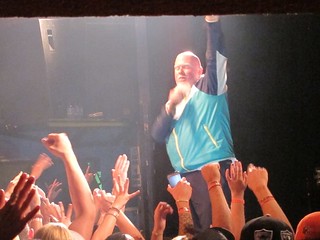
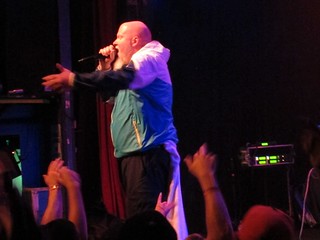
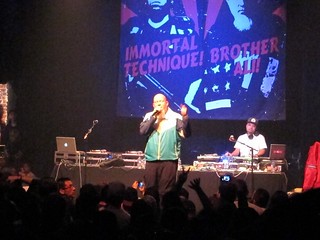
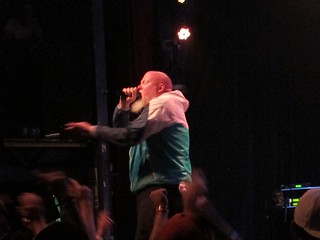

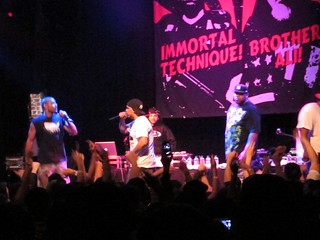
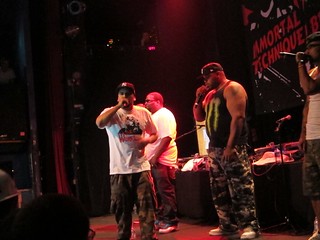
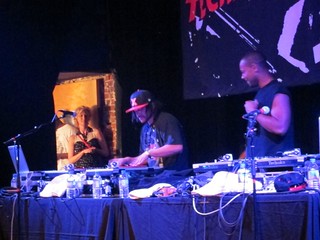

 It’s a flippant title but Adiós, I’m a Ghost sets the mood for this collection of disparate songs. But rather than cheekiness, abandonment is the unifying thread as the
It’s a flippant title but Adiós, I’m a Ghost sets the mood for this collection of disparate songs. But rather than cheekiness, abandonment is the unifying thread as the  At some point, every kid wants to grow up to be just like his dad someday. When your dad is Ali Farka Touré, known as Africa’s John Lee Hooker, then those are some bigger shoes to fill. The challenge was even harder after Ry Cooder introduced him to a wider American audience with their 1994 collaboration, Talking Timbuktu.
At some point, every kid wants to grow up to be just like his dad someday. When your dad is Ali Farka Touré, known as Africa’s John Lee Hooker, then those are some bigger shoes to fill. The challenge was even harder after Ry Cooder introduced him to a wider American audience with their 1994 collaboration, Talking Timbuktu.  Gogol Bordello doesn't so much march to the beat of a different drummer as dance to the rhythm of a crazy-quilt amalgam of percussion traditions. Starting from founder Eugene Hütz's Gypsy-Ukrainian roots, they've incorporated the ska-tinted punk of The Clash along with elements of jazz and rock and roll. Over time, the band has defied assimilation by absorbing every shiny musical tradition that catches their ear. So far, the Gypsy character still dominates by virtue of Hütz's thick accent and the exotic siren sound of minor key melodies. Moving beyond their loud, thrashy beginnings, their more recent albums, like 2010’s Trans-Continental Hustle, feature more studio polish as they evolve their sound. Pura Vida Conspiracy continues that direction, incorporating influences ranging from Latin rhythms to classic American country. Just as the Clash built on their punk foundation as they matured, Gogol Bordello holds on to their principles while following their muse.
Gogol Bordello doesn't so much march to the beat of a different drummer as dance to the rhythm of a crazy-quilt amalgam of percussion traditions. Starting from founder Eugene Hütz's Gypsy-Ukrainian roots, they've incorporated the ska-tinted punk of The Clash along with elements of jazz and rock and roll. Over time, the band has defied assimilation by absorbing every shiny musical tradition that catches their ear. So far, the Gypsy character still dominates by virtue of Hütz's thick accent and the exotic siren sound of minor key melodies. Moving beyond their loud, thrashy beginnings, their more recent albums, like 2010’s Trans-Continental Hustle, feature more studio polish as they evolve their sound. Pura Vida Conspiracy continues that direction, incorporating influences ranging from Latin rhythms to classic American country. Just as the Clash built on their punk foundation as they matured, Gogol Bordello holds on to their principles while following their muse. I remember Terri Nunn’s breathy voice. Full of seduction, she made Berlin one of my favorite bands for a while. Later, Julee Cruise’s ethereal vocals on “Falling”, from David Lynch’s “Twin Peaks,” would help create the mood of dreamy paralysis that permeated that show. Electro-pop has come to rely on the trope of the fragile nightingale, burying her under lacquered coats of reverb as she adds analog soul to the mix. These women usually have fine voices, but all too often, the music lacks the depth to carry them. Sure, there are still standouts like Niki Randa on Flying Lotus’ “Hunger” or Sarah Kinlaw of Softspot, but too many other projects just go through the motions.
I remember Terri Nunn’s breathy voice. Full of seduction, she made Berlin one of my favorite bands for a while. Later, Julee Cruise’s ethereal vocals on “Falling”, from David Lynch’s “Twin Peaks,” would help create the mood of dreamy paralysis that permeated that show. Electro-pop has come to rely on the trope of the fragile nightingale, burying her under lacquered coats of reverb as she adds analog soul to the mix. These women usually have fine voices, but all too often, the music lacks the depth to carry them. Sure, there are still standouts like Niki Randa on Flying Lotus’ “Hunger” or Sarah Kinlaw of Softspot, but too many other projects just go through the motions.
















